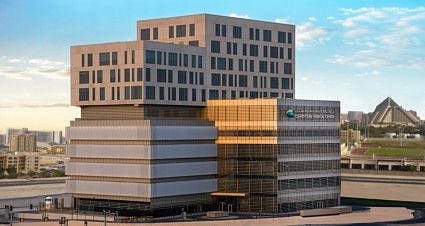Also In This Package
Dubai: Clemenceau Medical Centre hospital, Dubai, has successfully performed an aortic valve replacement (AVR) surgery in the UAE, using the novel Transcatheter Aortic Valve Implantation (Tavi) technology.
It was a spectacular example of sophisticated medical tourism as the 40-year-old patient flew in for the procedure. The surgery required the replacement of the aortic valve in the patient who was suffering from a weak cardiac muscle that had resulted in extreme narrowing of the aortic valve, resulting in difficulty in breathing. Following a careful observation of the severe condition, open-heart surgery was ruled out and the medical team decided to opt for a Tavi procedure instead.
Boost for medical tourism
Speaking on the development of the UAE’s health-care system, Abdulrahman Abdulaziz Khansaheb, chairman of the Board of Directors at the hospital, said: “The hospital has set a long-term objective to attract world-renowned health-care specialists who would play a pivotal role in advancing the UAE’s health-care sector, which is already of high standards. Today, we’re proud to announce such an extraordinary achievement in just two years.”
Khansaheb added: “A patient flying into the United Arab Emirates to undergo such a critical surgery at the Clemenceau Medical Center hospital in Dubai is, by itself, a great indicator of the hospital’s contribution to the progress of medical tourism sector in the country.”
Dr Wassim Shatila, Head of the Structural Heart Programme performed the surgery with the assistance of a medical team comprising the head of the Heart Failure Unit, Dr Righab Hamdan, Consultant Cardiac Surgeon Dr Walid Shaker, and the head of the Anaesthesiology and Resuscitation Unit, Dr Nauras Idriss.
Smooth procedure
Dr Shatila said: “This high-precision procedure requires the intervention of cardiac catheterisation specialists and the medical team at Clemenceau Hospital is nothing short of brilliant, with some of the best doctors and consulting surgeons in different specialities, especially in cardiovascular surgery and catheterisation, not to mention the hospital’s highly capable medical staff.”
Dr Hamdan added: “The Heart Failure Unit team successfully managed to treat the patient’s weak cardiac muscle for several months prior to the valve replacement surgery, whereby he underwent an intensive treatment programme within the unit. Following the treatment’s success, the condition stabilised and the patient was able to undergo the aortic valve replacement surgery without any significant complications or side effects.”
Also Read
UAE Ministry of Health and Prevention offers free gym access to all government employeesRegister COVID-19 vaccines received outside the UAE on Alhosn app‘My vision blurred...all I could utter was a single word-hospital’: How German nurse on a cruise got help from DubaiI was too young to know what cancer was, says teen survivor, in new book released in SharjahNew procedure a great hope for cardiac patients
Dr Shatila said, after this success, he expected a rise in the number of patients requiring such valve replacement, as the technology could be used to treat tens of patients in the UAE every month among those suffering from complex chronic diseases, including older patients who need their valves replaced but cannot undergo high-risk open-heart surgeries.
Sign up for the Daily Briefing
Get the latest news and updates straight to your inbox
Network Links
GN StoreDownload our app
© Al Nisr Publishing LLC 2026. All rights reserved.
